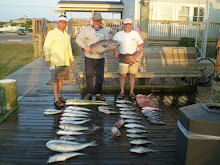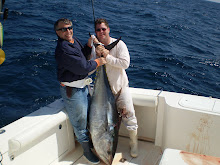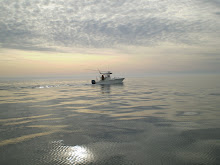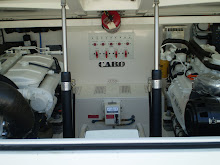
By Jim Field
Hopping in and out of restaurants on our fishing trips, the Crew oftentimes encounters menus with strange fish listed as entrees, names we've never heard of before. Half in jest, we wonder where these fish have come from--what explains their only recent appearance in restaurants. Are they new discoveries on the planet, placed now before us in a special cream sauce for the betterment of mankind? No chance. The real story, nine out of ten times, is the old "bait and switch," an ancient marketing ploy where one thing is promised but another delivered.
In the fishing realm today, bait and switch takes two forms. First, an existing unattractive name for a species is replaced with something sounding more mainstream or yummy. Second, the purveyor claims the fish to be "x" but in fact it turns out to be "y". An example of the latter is grouper in Florida: a NYTimes investigative article earlier this year uncovered that grouper is substituted about 80% of the time with something else in the Florida restaurants they sampled. The former use of bait and switch is the subject of today's post--where a name-change takes place. Today's subject: Chilean sea bass. Which I've always imagined to look like a striped bass, or large-mouth bass--you know, the bass we fish for locally. But...I would be wrong.
An article in today's NYTimes peripherally mentioned Chilean sea bass in reporting on fishing in the Ross Sea in Antarctica. Turns out the real name for Chilean sea bass--a mainstay in U.S. restaurants for some time now--is "Ross Sea toothfish," the first word also substituted using Antarctic or Patagonia. Seems this fish stock too is under pressure from overfishing, and of course, poaching.
Unfortunately, menu fish often go extinct in culinary and ecological terms, i.e., they show up for a period of time on menus only to disappear when the targeted fish stock is ravaged--we refer to this as the "fish-of-the-month" phenomenon. Woe the fish that's tasty--it's headed for catastrophe. So went the fate of the orange ruffy (whatever fish that really was) and others like it.
Here are some photographs and facts re our beloved Chilean sea bass--impostor that it is.
The toothfish in all its glory--an artistic photographic image

Its home on the globe: the Ross Sea in Antarctica
(Hey, not Chile!)

Standing on the Ross Sea

The real fish--a huge brute

Caught by long-line technique and gaffed aboard (machinery-assisted)

A poacher as caught by New Zealand air patrol

From a New Zealand dispatch accompanying the photograph of vessel:
An RNZAF [Royal New Zealand Air Force] patrol carrying out surveillance against illegal fishing in the Ross Sea yesterday saw the Triton-1 120 nautical miles within the area managed by the Commission for the Conservation of Antarctic Marine Living Resources (CCAMLR).
The RNZAF crew interrogated the vessel and reported the sighting, Mr Barker said.
“The vessel is flagged to Sierra Leone but appears to be operated by a Spanish company."
“Its detection is of very great concern. New Zealand is committed to combating illegal unreported and unregulated fishing in the Southern Ocean."
“These vessels have wreaked havoc on the valuable toothfish stocks in the Southern Ocean and have also caused considerable environmental damage, including to Antarctic seabirds over the years."
“New Zealand will be reporting the sighting to CCAMLR headquarters in Hobart urgently so all the Commission’s 25 members are made aware of the vessel’s activities,” Mr Barker said.
Response action includes the banning of trade in fish from the vessel and refusing access to members’ ports for the vessel.
The surveillance mission was undertaken through Operation Mawsoni, which is led by the Ministry of Foreign Affairs and Trade to support CCAMLR.
Mr Barker paid tribute to the RNZAF crew who detected the vessel on the 10-hour flight.
“Our long range maritime patrol capability is second to none and New Zealanders should be proud of their efforts,” Mr Barker said.
No whaling ships were detected on the patrol. The Japanese fleet is believed to be closer to Africa than New Zealand this summer.
Damn Japanese; posts on them to follow.









Again ill informed reporters giving genuine fisheries a bad name.
ReplyDeleteToothfish are caught in many places not just the Ross sea...The toothfish caught in the Ross sea are Antarctic toothfish.. Toothfish caught off Chile (Hence the name Chillean Sea Bass) are in fact Patagonian Toothfish...genetically and Physically different to Antarctic toothfish. A simple google search will confirm this. Please before you print a story spend half an hour researching the FACTS. I agree with name changes to sell the fish though...that is pure marketing. Although Orange Roughy is called...Surprise surprise "Orange Roughy".